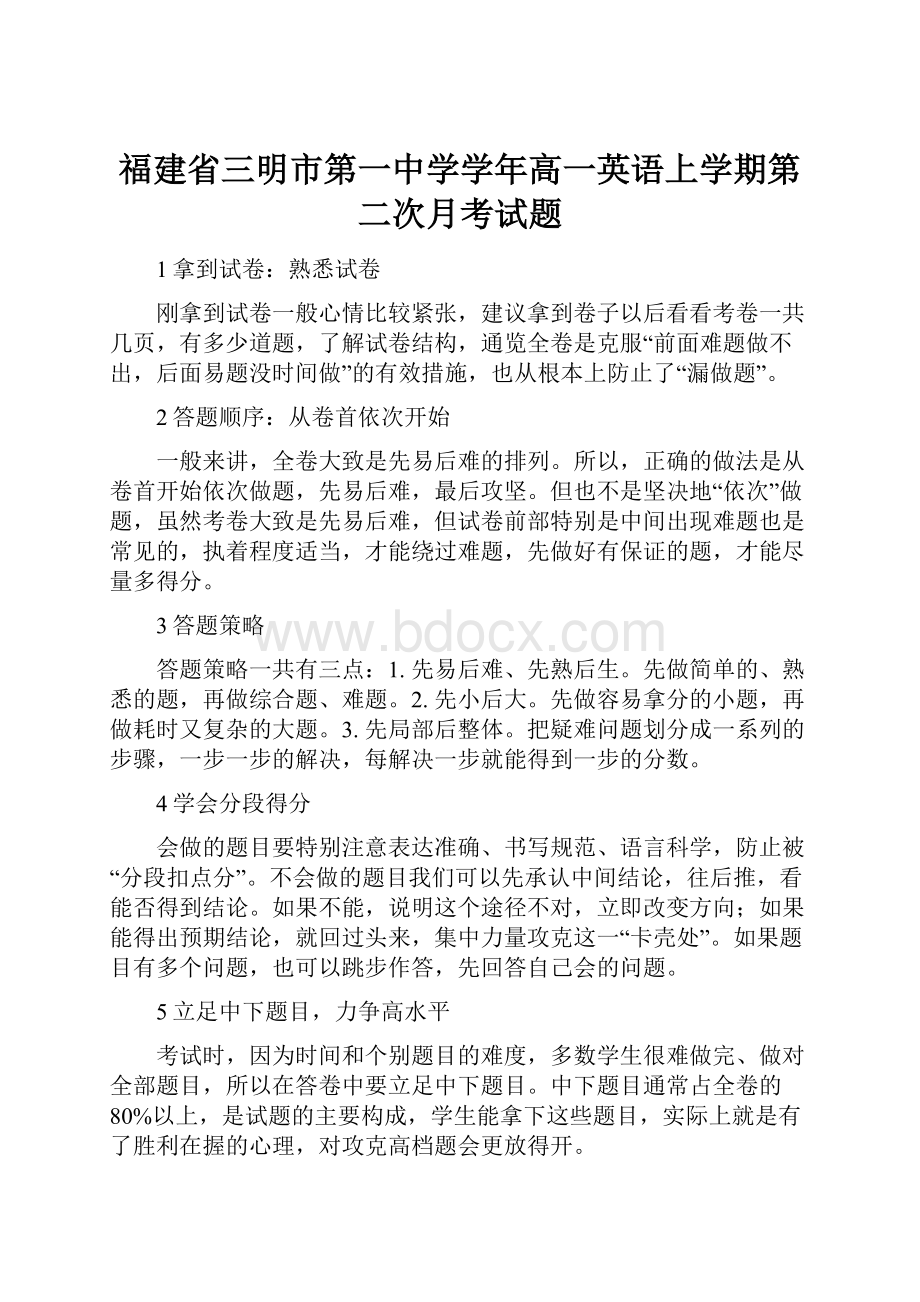福建省三明市第一中学学年高一英语上学期第二次月考试题.docx
《福建省三明市第一中学学年高一英语上学期第二次月考试题.docx》由会员分享,可在线阅读,更多相关《福建省三明市第一中学学年高一英语上学期第二次月考试题.docx(21页珍藏版)》请在冰豆网上搜索。

福建省三明市第一中学学年高一英语上学期第二次月考试题
1拿到试卷:
熟悉试卷
刚拿到试卷一般心情比较紧张,建议拿到卷子以后看看考卷一共几页,有多少道题,了解试卷结构,通览全卷是克服“前面难题做不出,后面易题没时间做”的有效措施,也从根本上防止了“漏做题”。
2答题顺序:
从卷首依次开始
一般来讲,全卷大致是先易后难的排列。
所以,正确的做法是从卷首开始依次做题,先易后难,最后攻坚。
但也不是坚决地“依次”做题,虽然考卷大致是先易后难,但试卷前部特别是中间出现难题也是常见的,执着程度适当,才能绕过难题,先做好有保证的题,才能尽量多得分。
3答题策略
答题策略一共有三点:
1.先易后难、先熟后生。
先做简单的、熟悉的题,再做综合题、难题。
2.先小后大。
先做容易拿分的小题,再做耗时又复杂的大题。
3.先局部后整体。
把疑难问题划分成一系列的步骤,一步一步的解决,每解决一步就能得到一步的分数。
4学会分段得分
会做的题目要特别注意表达准确、书写规范、语言科学,防止被“分段扣点分”。
不会做的题目我们可以先承认中间结论,往后推,看能否得到结论。
如果不能,说明这个途径不对,立即改变方向;如果能得出预期结论,就回过头来,集中力量攻克这一“卡壳处”。
如果题目有多个问题,也可以跳步作答,先回答自己会的问题。
5立足中下题目,力争高水平
考试时,因为时间和个别题目的难度,多数学生很难做完、做对全部题目,所以在答卷中要立足中下题目。
中下题目通常占全卷的80%以上,是试题的主要构成,学生能拿下这些题目,实际上就是有了胜利在握的心理,对攻克高档题会更放得开。
6确保运算正确,立足一次性成功
在答卷时,要在以快为上的前提下,稳扎稳打,步步准确,尽量一次性成功。
不能为追求速度而丢掉准确度,甚至丢掉重要的得分步骤。
试题做完后要认真做好解后检查,看是否有空题,答卷是否准确,格式是否规范。
7要学会“挤”分
考试试题大多分步给分,所以理科要把主要方程式和计算结果写在显要位置,文科尽量把要点写清晰,作文尤其要注意开头和结尾。
考试时,每一道题都认真思考,能做几步就做几步,对于考生来说就是能做几分是几分,这是考试中最好的策略。
8检查后的涂改方式要讲究
发现错误后要划掉重新写,忌原地用涂黑的方式改,这会使阅卷老师看不清。
如果对现有的题解不满意想重新写,要先写出正确的,再划去错误的。
有的同学先把原来写的题解涂抹了,写新题解的时间又不够,本来可能得的分数被自己涂掉了。
考试期间遇到这些事,莫慌乱!
不管是大型考试还是平时的检测,或多或少会存在一些突发情况。
遇到这些意外情况应该怎么办?
为防患于未然,老师家长们应该在考前给孩子讲清楚应急措施,告诉孩子遇事不慌乱,沉重冷静,必要时可以向监考老师寻求帮助。
三明一中2018-2019学年上学期第二次月考
高一英语试题
(时间:
120分钟;满分:
100分)
第一部分听力(共两节,满分20分)
第一节听下面5段对话。
每段对话后有一个小题,从题中所给的A、B、C三个选项中选出最佳选项,并标在试卷的相应位置。
听完每段对话后,你都有10秒钟的时间来回答有关小题和阅读下一小题。
每段对话仅读一遍。
1.Whatdoesthemanwanttodo?
A.Eatdinner.B.Watchamovie.C.Getsomeicecream.
2.Whatdoesthemansuggesttheydotogether?
A.Learntodrawanimals.B.Raiseapet.C.Gotothezoo.
3.Whatdoesthewomanwatchatnightsometimes?
A.Thefilms.B.Thenews.C.Themusicprograms.
4.Whatdoesthemanthinkofmath?
A.It’sconfusing.
B.It’sinteresting.
C.Itmakeshimsmarter.
5.WhenisPeter’sbirthday?
A.Saturday.B.Sunday.C.Monday.
第二节听下面5段对话或独白。
每段对话或独白后有几个小题,从题中所给的A、B、C三个选项中选出最佳选项,并标在试卷的相应位置。
听每段对话或独白前,你将有时间阅读各个小题,每小题5秒钟;听完后,各小题将给出5秒钟的作答时间。
每段对话或独白读两遍。
听第6段材料,回答第6、7题。
6.What’swrongwiththeman?
A.Histeamdidn’twin.
B.Hehittheballtoohard.
C.Hedidn’tsleepwell.
7.Howmanygamesdidthemanplay?
A.One.B.Two.C.Three.
听第7段材料,回答第8、9题。
8.Whatdidthewomanseeonthefirstday?
A.HydePark.B.TheBritishMuseum.C.TheLondonzoo.
9.WhydoesthewomanprobablythinkEnglishpeopleliketea?
A.Itrainssomuchthere.
B.Theysellitinthestreet.
C.It’sbetterfortheirhealth.
听第8段材料,回答第10至12题。
10.WhatwasAndrewlikeattheconcert?
A.Calm.B.Nervous.C.Excited.
11.HowdidAndrewperform?
A.Hedidn’tmakeanymistakes.
B.Hemadealotofmistakes.
C.Hemadesomelittlemistakes.
12.Howdoesthewomanfeelnow?
A.Prettysad.B.Quiteglad.C.Alittleworried.
听第9段材料,回答第13至16题。
13.Whatarethespeakersdiscussing?
A.TheeducationinAmerica.B.Thechoiceofclubs.C.Highschoollife.
14.Whatteamwasthewomanoninhighschool?
A.Tennis.B.Basketball.C.Swimming.
15.Wherewasthewomanlastyear?
A.Canada.B.Japan.C.America.
16.Whatwouldthewomanliketodointhefuture?
A.Startrowingagain.
B.Gorunningaroundalake.
C.Goswimminginariver.
听第10段材料,回答第17至20题。
17.Wherewillthestudentsgo?
A.Atheater.B.Abigpark.C.Azoo.
18.Whichofthefollowinghasdisplaysfromdifferentcountries?
A.TheJapaneseTeaGarden.
B.TheHouseofFlowers.
C.TheDeYoungMuseum.
19.WhatisintheJapaneseTeaGarden?
A.Aconcerthall.B.Asmalllake.C.Anartgallery.
20.WhereisGoldenGatePark?
A.Inthecountryside.
B.Inthemiddleofthecity.
C.Closetothecity.
第二部分阅读理解(共两节,满分20分)
第一节(共15小题;每小题1分,满分15分)
阅读下列短文,从每题所给的四个选项(A、B、C和D)中,选出最佳选项,并在答题卡上将该项涂黑。
A
IadmiremyfatherforaslongasIcanremember.Ilovedthewayhetreatedpeoplewithsuchrespectandkindness.
OnSundaysweusuallytookthebusintoManhattan,wherewewoulddointerestingthings,likeridingtheCircleLine.Hewouldpointouteverylandmarkandtellusthehistorybehindit.HelovedtotakeusonthesubwaytoNathan’sinConeyIsland.Oncethere,hewouldgivemysisterandmeeachafive-dollarbillandthenhewouldenjoyhimselffortheafternoonwithhisnewspapers.
In1968,wewenttoseethemovie“Oliver”,aCharlesDickens’classicstoryofayoungorphan(孤儿)boycalledOliver.Onthewayhomefromthetheaterthatafternoonhetoldushowhewasraisedinanorphanage(孤儿院)inNewYorkafterbothofhisparentsdied.Hetoldusthenuns(修女)werewonderfultohimandlovedhimlikeamotherwould.Ashegrewolder,hewasplacedinafewfoster(寄养)familiesbeforehejoinedtheArmy.
Whenwewereteenagers,hestilltookusouteachweekendandhewouldaskustoinvitespecificfriendstojoinusandhewouldpayforthem.WeoftenwenttoYankeeStadiumtowatchthebaseballgameandheboughtusticketsintheleastexpensiveseats.Tokeepthecostdown,hewaitedforusinthecarwherehereadhisnewspapersandthentookanap(小睡).
Hewasalwayshappyandappreciatedeverythinghehad.Helovedhistwolittlegirlsandlaterhistwogranddaughters.Hegavesomuch,yethehadsolittle.Hethoughthewastherichestmanintheworld.
21.Whatwouldthewriter’sfatherdowheninNathan’s?
A.Hewoulddointerestingthings,likeridingtheCircleLine.
B.Hewouldpointouteverylandmarkandhaveagoodrest.
C.Hewouldwaitforusandreadnewspapers.
D.Hewouldgivemysisterandmethechancetolearn.
22.Whatdidthewriter’sfatherandOliverhaveincommon?
A.TheybothlikedCharlesDickens’stories.
B.Theybothhadeverbeenanorphan.
C.Theywerebothadopted(收养)byfamilies.
D.Theybothhadbeenabravesoldier.
23.Howdidthewriter’sfatherfindthelifeintheorphanage?
A.Terrible.B.Satisfying.C.Tiring.D.Disappointing.
24.Whydidthewriter’sfatherchoosetotakeanap?
A.Becausehewantedtosavesomemoney.
B.Becausehewantedtobuyusexpensiveseats.
C.Becausehewantedtohaveaverygoodseat.
D.Becausehewantedtorewardhisfosterparents.
B
Peopleoftensaythatthereisnothingintheworldthatcanbeasgreatasamother’slove.Somemotherexpressionsmeanjustthat.Thephrase“motherlode”comesfrommining.Itmeanstheplacewherethelargestamountofgoldcanbefound.Butnow,theterm“motherlode”meansarichsupplyofanything.Forexample,youmightsay,“Shejustgraduatedfromcollegeandstruckthemotherlodewithhernewjob!
”
Whenwecallsomething“themotherofall”,thismeansitisthebiggestorbestofsomething.Hereisanexample:
“Wearegoingtothrowthemotherofallpartiesthisweekend.Soyouhavetocome!
”
Naturally,theword“mother”canbeusedtomeantogivebirth,eventosomethingyoucannottouch,suchasanideaorwisdom.Thesaying“necessityisthemotherofinvention”meansthatwhenpeoplereallyneedtodosomething,theywillfindawaytodoit.And“experienceisthemotherofwisdom”meansthatpeoplelearnfromwhathappenstothem.
Youmightthinkallexpressionsaboutmothersaresweetandloving.Notso.Aboywhois“tiedtohismother’sapronstrings(围裙带)”iscontrolledbyhismother.Wecanalsocallhima“mama’sboy”.Bothofthesetermsareevenmoreinsulting(侮辱人的)ifyouaretalkingaboutaman,notayoungboy.Itcanbeahugemistakeforawomantomarrya“mama’sboy”whoisstill“tiedtohismother’sapronstrings”.
Ashowaboutmotherswouldnotbecompletewithouttalkingabouttheverypopularbutmysterious“MotherGoose”.Theshortpoemsandsongsthat“MotherGoose”wroteareapartofgrowingupintheUnitedStates.Realornot,youcouldsay“MotherGoose”isthemotherofallnurseryrhyme(童谣)writers.
25.Thepassagemainlytellsusthat________.
A.allmotherexpressionsareaboutnicethings
B.motheristhegreatestpersonintheworld
C.therearesomeexpressionsaboutmotherinEnglish
D.mother’sloveisthegreatestthingintheworld
26.Ifyoustrikethemotherlode,youwill________.
A.berich
B.getinjured
C.havetoworkhard
D.getaneasyjob
27.Whensaying“Iheardthemotherofallsongs”,thepersonmeans________.
A.heheardyourmothersingsongs
B.mothersweregoodatsinging
C.helovedsongsaboutmothers
D.thesongheheardwasthebest
C
Whywecrywithhappinessshow:
Respondingwithanegativereactionhelpsusdealwithextremejoy.Ifyoucrywithhappinessatweddings,youarerespondingtoahappyexperiencewithanegativereaction.Theresearchersbelievetheunusualreactionmayhelprenewemotionalbalanceinusandkeepextremeemotionsundercontrol.Thefindingsmakeitclearhowpeopleexpressandcontroltheiremotions,whichcouldhelpimprovetheirunderstandingofpeople’smental(精神的)health.
DrOrianaAragonsetouttoexplorethephrase“tearsofjoy”,whichshesaidnevermadesensetoher.Butafterstudyingaseriesofincongruous(不和谐的)expressions,shenowunderstandsbetterwhypeoplecrywhentheyarehappy.“Peoplemayberenewingemotionalbalancewiththeseexpressions,”sheexplained.“Theyseemtotakeplacewhenpeoplearestruckbystrongpositiveemotions.People,whodothis,seemtorecoverbetterfromthosestrongemotions.”
Thereportshowvariousexamplesofrespondingtoapositiveexperiencewithanegativeemotion,suchas,acryingwifeseeingthehusbandreturningfromwaragain,andteenagegirlsscreamingataJustinBieberconcert.Examplesalsoincludeabaseballplayerwhohitsahomerun,onlytobeslapped(拍)onthebackbyteammates,aswellaswhenpeoplecannothelpkissingbabies’faceswhotheyconsiderlovely.
DrAragonandherteamdiscoveredthatpeople,whoexpressednegativereactionstopositivenews,wereabletomoderate(缓和)